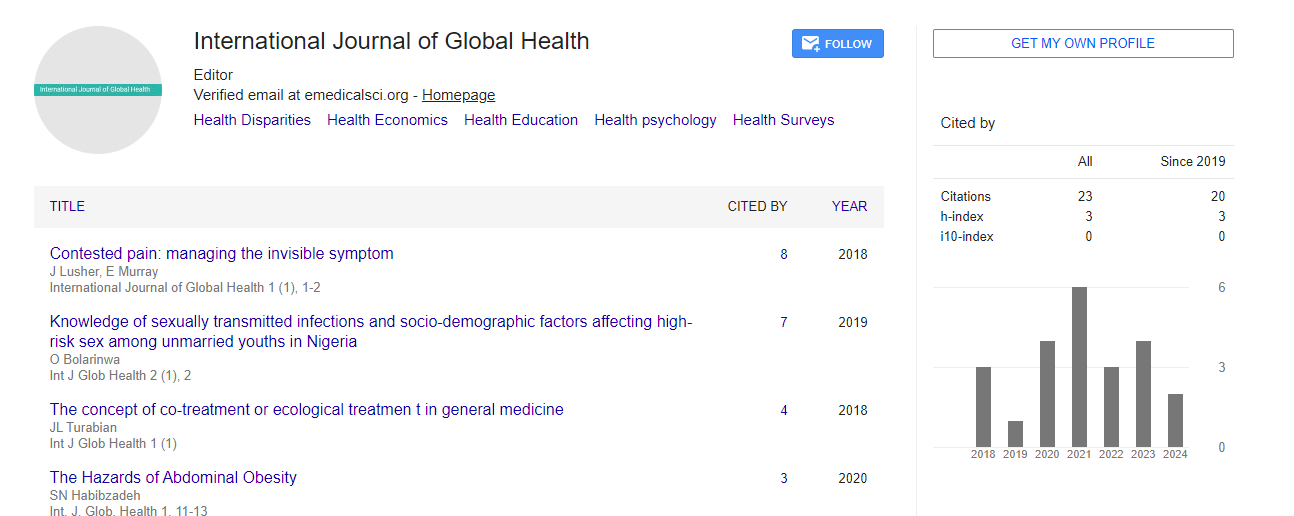Perspective, Int J Glob Health Vol: 6 Issue: 1
Addressing the Inequities in Healthcare Access and Outcomes
Olga Marshall*
Department of Internal Medicine, University of Missouri, Missouri, Columbia
*Corresponding Author: Olga Marshall
Department of Internal Medicine
University of Missouri, Missouri
Columbia
Email: marshallolga@gmail.com
Received date: 21 February, 2023, Manuscript No. IJGH-23-93525;
Editor assigned date: 23 February, 2023, PreQC No. IJGH-23-93525 (PQ);
Reviewed date: 09 March, 2023, QC No. IJGH-23-93525;
Revised date: 16 March, 2023, Manuscript No. IJGH-23-93525 (R);
Published date: 23 March, 2023, DOI: 10.4172/Ijgh.1000167
Citation: Marshall O (2023) Addressing the Inequities in Healthcare Access and Outcomes. Int J Glob Health 6:1 .
Description
Health disparities refer to the differences in health outcomes and access to healthcare services among different population groups. These disparities are often linked to social, economic, and environmental factors and can result in poorer health outcomes for certain communities.
Causes
• Health disparities are caused by a complex interplay of social,
economic, and environmental factors. Some of the common causes
of health disparities are:
• Low-income and marginalized communities often face barriers to
accessing healthcare services due to lack of insurance coverage,
transportation, and language barriers.
• Minority communities face higher rates of chronic diseases such as
diabetes, heart disease, and cancer due to structural racism,
discrimination, and bias in healthcare.
• Rural communities often have limited access to healthcare services
due to lack of healthcare providers, facilities, and resources.
• Poor air quality, water contamination, and exposure to toxins can
have adverse health effects on communities, especially those living
in disadvantaged areas.
Consequences
• Health disparities have significant consequences on individuals,
communities, and the healthcare system. Some of the consequences
of health disparities are:
• Individuals from disadvantaged communities are more likely to
experience poor health outcomes, such as premature death,
disability, and chronic diseases.
• Health disparities can result in higher healthcare costs due to
increased hospitalization rates, emergency room visits, and chronic
disease management.
• Poor health outcomes can affect an individual's ability to work and
contribute to the economy, leading to reduced productivity and
income.
Strategies to address health disparities
Addressing health disparities requires a comprehensive approach that addresses the root causes of these disparities. Some of the strategies to address health disparities are:
Improve access to healthcare: Providing affordable, accessible, and culturally competent healthcare services can improve health outcomes for disadvantaged communities. This can be achieved through policies such as expanding Medicaid coverage, increasing funding for community health centers, and providing language interpretation services.
Addressing social determinants of health, such as poverty, housing, and education, can improve overall health outcomes for disadvantaged communities. This can be achieved through policies such as increasing the minimum wage, investing in affordable housing, and improving access to quality education.
Promoting health equity involves addressing structural racism, discrimination, and bias in healthcare. This can be achieved through policies such as increasing diversity in the healthcare workforce, providing cultural competence training to healthcare providers, and implementing anti-discrimination laws.
Investing in research can help identify the root causes of health disparities and develop effective interventions to address them. This can be achieved through funding research studies focused on health disparities, encouraging the participation of diverse populations in research studies, and promoting the dissemination of research findings.
Health disparities are a complex and multifaceted issue that requires a comprehensive approach to address them. Improving access to healthcare, addressing social determinants of health, promoting health equity, and investing in research can help reduce health disparities and improve health outcomes for disadvantaged communities. By working together, policymakers, healthcare providers, and communities can create a more equitable and just healthcare system for all.
 Spanish
Spanish  Chinese
Chinese  Russian
Russian  German
German  French
French  Japanese
Japanese  Portuguese
Portuguese  Hindi
Hindi 
